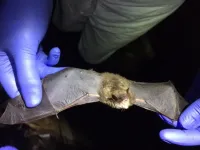Deadly white-nose syndrome changed genes in surviving bats
Study has big implications for management of bat populations
2021-02-04
(Press-News.org) Scientists have found genetic differences between bats killed by white-nose syndrome and bats that survived, suggesting that survivors rapidly evolve to resist the fungal disease, according to a Rutgers-led study with big implications for deciding how to safeguard bat populations.
White-nose syndrome has killed millions of bats in North America since 2006, following its introduction from Europe. The syndrome, caused by the fungal pathogen Pseudogymnoascus destructans, is arguably the most catastrophic wildlife disease in history. It has led to unprecedented declines in many North American bat species, including the little brown bat (Myotis lucifugus).
"Our finding that little brown bat populations have evolved, which could be why they survived, has large implications for management of bat populations going forward," said lead author Sarah Gignoux-Wolfsohn, a former postdoctoral associate at Rutgers University-New Brunswick now at the Smithsonian Environmental Research Center in Maryland. "Management decisions, such as whether to treat for white-nose syndrome or protect populations from other detrimental factors, can be informed by knowing which bats are genetically resistant to the disease."
"The deployment of vaccines or treatments for the fungus may be most needed in populations with few disease-resistant individuals," said Gignoux-Wolfsohn, who led the study - published in the journal Molecular Ecology - while at Rutgers. "Our study also has implications for other diseases that cause mass mortality. While rapid evolution in response to these diseases is often difficult to detect, our study suggests it may be more common than previously thought."
The disease got its name because the fungus, which grows in cold, dark and damp places, sometimes looks like white fuzz on bats' faces, according to the White-Nose Syndrome Response Team led by the U.S. Fish and Wildlife Service. The fungus attacks the bare skin of bats when they're hibernating and relatively inactive. As it grows, the fungus causes changes in bats that make them become unusually active and burn up fat they need to survive winter. Infected bats may do strange things, such as fly outside in the daytime during winter.
Before white-nose syndrome arrived in North America, the little brown bat was one of the most widespread bat species. The disease has caused populations to decline by about 78 percent, killing many hibernating colonies. Still, some populations appear to be recovering after significant declines, likely due to increased disease resistance.
Scientists sequenced bat genomes from three hibernating colonies in abandoned mines in New York, New Jersey and Vermont to determine whether little brown bats evolved as a result of the disease. They compared the genomes of bats killed by white-nose syndrome to survivors in recovering populations to identify genetic differences that may be responsible for survival.
The bats' evolution appears to have particularly affected genes associated with weight gain before hibernation and behavior during hibernation. Rapid evolution may have allowed the remaining bats to keep hibernating and survive infection that killed off millions of other bats.
"Evolution is often thought of as a process that happened long ago," Gignoux-Wolfsohn said. "We have found that it has also been happening right in our backyards and barns over the last decade."
The scientists are conducting a similar study in Indiana bats (Myotis sodalis). While also affected by white-nose syndrome, this species has experienced lesser declines than little brown bats.
INFORMATION:
Rutgers co-authors include Professor Malin L. Pinsky, wildlife expert Kathleen Kerwin and Professor Brooke Maslo, senior author. Scientists at the New York State Department of Environmental Conservation; New Jersey Department of Environmental Protection; Vermont Fish and Wildlife Department; University of Tennessee, Knoxville; and the National Institute for Mathematical and Biological Synthesis contributed to the study.
[Attachments] See images for this press release:

ELSE PRESS RELEASES FROM THIS DATE:
2021-02-04
Lots of us are feeling pretty anxious about the destruction of the natural world. It turns out, humans aren't the only ones stressing out--by analyzing hormones that accumulate in fur, researchers found that rodents and marsupials living in smaller patches of South America's Atlantic Forest are under more stress than ones living in more intact forests.
"We suspected that organisms in deforested areas would show higher levels of stress than animals in more pristine forests, and we found evidence that that's true," says Noé de la Sancha, a research associate at the Field Museum in Chicago, Associate Professor of Biology at Chicago State University, ...
2021-02-04
New research published today in the journal Scientific Reports based on the largest-to-date analysis of commercial data on egg-laying hen mortality finds that mortality in higher-welfare cage-free housing systems decreases over time as management experience increases and knowledge accrues.
This finding marks a major turning point in the debate over the transition in housing systems for egg-laying hens from battery cages to indoor cage-free systems, which some egg producers have argued would increase hens' mortality even as it allowed birds to stretch their wings.
The study, authored by Dr. Cynthia Schuck-Paim and others, included data from 16 countries, 6,040 commercial flocks, and 176 million hens in a variety of caged and ...
2021-02-04
DALLAS, Feb. 4, 2021 -- Stroke and heart attack survivors can reduce multiple causes of death and prevent further cardiovascular events by drinking green tea, according to new research published today in Stroke, a journal of the American Stroke Association, a division of the American Heart Association. The study also found daily coffee consumption helps heart attack survivors by lowering their risk of death after a heart attack and can prevent heart attacks or strokes in healthy individuals.
Previous research has examined the benefits of green tea and coffee on heart health in people without a history of cardiovascular disease or cancer. Researchers in ...
2021-02-04
BOSTON - Medical histories of patients collected and stored in electronic health records (EHR) can be rapidly leveraged to predict the probability of death from COVID-19, information that could prove valuable in managing limited therapeutic and preventive resources to combat the devastating virus, researchers from Massachusetts General Hospital (MGH) have found. In a study published in npj Digital Medicine, the team described how artificial intelligence (AI) technology enabled it to identify factors such as age, history of pneumonia, gender, race and comorbidities like diabetes and cancer as predictors of poor outcomes in COVID-19 patients.
"By combining computational methods and clinical expertise, we developed a set of models to forecast ...
2021-02-04
The open ocean is a harsh place for newborn fishes. From the minute larvae hatch from their eggs, their survival depends upon finding food and navigating ocean currents to their adult habitats--all while avoiding predators. This harrowing journey from egg to home has long been a mystery, until now.
An international team including scientists from the Arizona State University Center for Global Discovery and Conservation Science (GDCS), NOAA's Pacific Islands Fisheries Science Center, and the University of Hawai'i at Mānoa have discovered a diverse array of young marine animals finding refuge within so-called 'surface slicks' in Hawai'i. Surface slicks create a superhighway of nursery habitat for more than 100 species of commercially and ecologically ...
2021-02-04
To survive the open ocean, tiny fish larvae, freshly hatched from eggs, must find food, avoid predators, and navigate ocean currents to their adult habitats. But what the larvae of most marine species experience during these great ocean odysseys has long been a mystery, until now.
A team of scientists from NOAA's Pacific Islands Fisheries Science Center, the University of Hawai'i (UH) at Mānoa, Arizona State University and elsewhere have discovered that a diverse array of marine animals find refuge in so-called 'surface slicks' in Hawai'i. These ocean features ...
2021-02-04
The Institute for Scientific Information on Coffee (ISIC) published a new report today, titled 'Coffee and sleep in everyday lives', authored by Professor Renata Riha, from the Department of Sleep Medicine at the University of Edinburgh. It reviews the latest research into coffee's effect on sleep and suggests that while drinking coffee early in the day can help support alertness and concentration levels1, especially when sleep patterns are disturbed; decreasing intake six hours before bedtime may help reduce its impact on sleep2.
Coffee is largely consumed daily for the pleasure of its taste3, as well as its beneficial effect on wakefulness and concentration (due to its caffeine content)4. ...
2021-02-04
A new study further highlighting a potential physiological cause of clinical depression could guide future treatment options for this serious mental health disorder. Published in Frontiers in Psychiatry, researchers show differences between the cellular composition of the brain in depressed adults who died by suicide and non-psychiatric individuals who died suddenly by other means.
"We found a reduced number of astrocytes, highlighted by staining the protein vimentin, in many regions of the brain in depressed adults," reports Naguib Mechawar, a Professor at the Department of Psychiatry, McGill University, Canada, and senior author of this article. ...
2021-02-04
Researchers from University of Notre Dame, York University (Canada), and University of New England (Australia) published a new paper in the Journal of Marketing that identifies a novel reason why people under-save and demonstrates a simple, short, and inexpensive intervention that increases intentions to save and actual savings.
The study, forthcoming in the Journal of Marketing, is titled "Popping the Positive Illusion of Financial Responsibility Can Increase Personal Savings: Applications in Emerging and Western Markets" and is authored by Emily Garbinsky, Nicole Mead, and Daniel Gregg.
People around the world are not saving enough money. Since increasing ...
2021-02-04
WASHINGTON--The start of California's annual rainy season has been pushed back from November to December, prolonging the state's increasingly destructive wildfire season by nearly a month, according to new research. The study cannot confirm the shift is connected to climate change, but the results are consistent with climate models that predict drier autumns for California in a warming climate, according to the authors.
Wildfires can occur at any time in California, but fires typically burn from May through October, when the state is in its dry season. The start of the rainy season, historically in November, ends wildfire season as plants become too moist to burn.
California's rainy season has been starting progressively later in recent decades and climate ...
LAST 30 PRESS RELEASES:
[Press-News.org] Deadly white-nose syndrome changed genes in surviving bats
Study has big implications for management of bat populations



